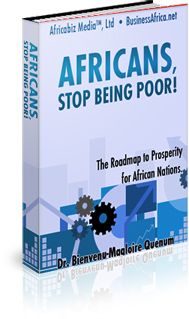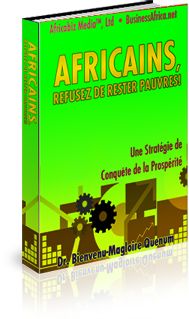|
****JavaScript based drop down DHTML menu generated by NavStudio. (OpenCube Inc. - http://www.opencube.com)****



|
|
!
|
|
AFRICABIZ
VOL 1- ISSUE: 37
MAY
15 - JUNE 14, 2002
Previous
Issue
Editor: Dr. Bienvenu-Magloire
Quenum
Click here for contact & support console
|
| A
WORD FROM THE EDITOR
|
|
|
|
Dear visitor and international investor,
We
warmly welcome you, if this is
your first visit to Africabiz
Online - The ultimate newsletter
on trading and investing in 49
sub-Saharan African countries.
If you are a regular and faithful
reader, welcome back.
If you are a regular and faithful reader, welcome back.
-
THIRD ANNIVERSARY
This delivery marks the third anniversary of AFRICABIZ
Online. Every month, since 37 months, we provided you
with news and information about sub-Saharan African
countries - with regards investing atmosphere - and
delivered to you score of astounding business opportunities
capable of generating double-digit annual growth rate.
Many feedback encourage us to continue on the same line
of delivering free
content about investing and trading in and out Africa.
-
TO BUILD ON EXISTING
ASSETS OR START AFRESH FROM RUBBLES?
Since three years, the international community witnessed
with amazement and bewilderment the erratic land reform's
policy performed by Zimbabwe's Mugabe - click
here for updated news on Zimbabwe.
Now, in the middle of year 2002, came the time of reckoning:
Zimbabwe is hit by famine. Mugabe declares states
of emergency. In other words Mugabe launches a May Day
message for Aid Agencies to supply food to Zimbabwe.
Mugabe is blaming persisting drought in Southern Africa
for the famine.
One could, however, wonder if drought isn't the perfect
scapegoat behind which Mugabe is hiding to escape from
his glaring political and economical mistakes. Is drought
the real cause for famine in Zimbabwe? As a faithful
reader of AFRICABIZ Online put it:
|
From:
@daffodil.com Sent: Friday, May 03, 2002 5:50 PM
To: editor@africabiz.org
Subject: ZIMBABWE
GOVERNMENT SPONSORS DESTRUCTION OF PRODUCTION
AND CALLS FOR SUPPORT AT THE SAME TIME ?
Thought you might have an answer to such a question
? How can a Government sponsor and support wholesale
looting and destruction of a once very productive
food base (and foreign currency earner) and at
the same time go out and call for international
aid ?
|
Sad.
Isn't? To see Zimbabwe in such dire straits. A country
which used to stand as a regional economic power to
be now down on its knees to such a "degrading"
state of begging for food.
It is obvious that land reform to empowering Zimbabwe's
black farmers is a absolute necessity. That reform,
however, could have been planned and performed with
sagacity to protecting the existing and efficient agricultural
structure developed by Zimbabwe's white farmers.
In the contrary Robert Mugabe led a demagogic policy
of land invasion and seizure, which doubtless played
a great part in the current state of famine as per May
2002.
One could wonder why the land reform problem remained
dormant for quite 23 years (since the independence day)
to be suddenly addressed in a manner of improvisation,
confusion and snafu. It seems that Zimbabwe's ruling
party, under the leadership of Mugabe, acted just to
satisfy the interests of a gang, which only target is
to hang on to power. Disregarding, first, the detrimental
economic and social cost to the country; and second,
subsequent damage done to Africa's image and standing
vis-à vis the international community of investors.
Let's hope that other African decision makers throughout
the continent will learn from the sad and quick crash
of Zimbabwe's agriculture. Let's hope that they will
stop short from making the same aberrant political and
economical mistakes. Let's hope that they won't act
like Emperor Nero.
We African will gain more in terms of economic development
if we always take sound political and economic decisions
to preserving existing assets. Whatever may be the resentful
thoughts we still ruminate about past behavior of former
colonial powers and some of African citizens we must
resist temptation of harsh actions, which are counter
productive.
We should realize that it is always better to build
on existing assets; instead of starting from rubbles.
Any African country, which nowadays adopts destructive
strategy like Zimbabwe's Mugabe cannot expect to be
salvaged by the international community. Anyway,
even if some international aid is given in such circumstances,
the country is still loosing as donated food competes
with local agriculture's production and deprive local
farmers from much needed revenues. The national
authorities also are the big losers. Their decision
making freedom is challenged by would be donors. Click
here for an article titled: Donnors tell Mugabe:
no devaluation, no food aid by Abel Mutsakani
News Editor of Zimbabwe's Financial Gazette dated
5/9/02 3:11:41 AM (GMT +2)
Furthermore there are now plenty of other countries
around the world; which cry for help and deserve more
to be assisted than those which purposely destroy their
own hard built assets.
Contributor's
Guidelines is here
to review. Your contribution on "How African countries
/ entrepreneurs could bridge the developing gap"
is welcome.
Many
thanks for dropping by and see you here on June 15,
2002.
Dr.
B.M. Quenum
Editor
of AFRICABIZ

|
|
|
|
BUSINESS
OPPORTUNITIES IN AFRICA
|
|
-
Several business opportunities with high profit making
potential which are economic
catalysts and components to the Strategy for African Countries - here
available - have been introduced to you. They are listed
in following table.
|
a-
SHEA BUTTER (Issues 5,
6,
7,
11,
12,
13)
b- BLUE GOLD (Issues 14,
15,
16,
17,
18,
19)
c- FREEZE-DRIED PAPAIN (Issues 20,
21,
22
and here)
d- KENAF (Issues 23,
24)
e- VEGETABLE OIL (Issues 25,
26,
27
and 28)
f- CEREALS (Issues 30,
31,
32,
33)
g- FRUITS (34,
35,
36)
|
-
TROPICAL FRUITS INDUSTRY AS INCOME
BUILDING POWER FOR AN AFRICAN COMMUNITY /
PART IV : GLOBAL OVERVIEW OF PASSIONFRUIT'S AGRIBUSINESS
In Issue
N° 35 an investment estimate to establishing
500 hectares of Passionfruit agribusiness had been exposed.
And we evaluated the purchasing price of the raw
material (passionfruit) by the processing plant being
equal to US $ 86 per metric ton.
In
Issue N° 36 investment related to establishing
a processing plant for the transformation of 7,500 metric
tons of passionfruit produced by the plantation had
been exposed.
-
ANIMAL FEED PRODUCTION
During the daily processing of 28,846 metric tons of
passionfruit, 2,500 kg per hour of following
byproducts are generated:
These
byproducts are suitable to manufacturing animal feed
through an adequate technology of mixing them with limepowder.
The resulting hydrated cake is pressurized to remove
the remaining juice. The dehydrated cake is then dried
out in a desiccator to produce granulates of good quality
animal feed.
Quantity of granulates per hour: 563 kg / hour
(from 2,500 kg of raw material as above outlined). That
is to say 4,500 metric tons per days or 4,500 x 260
= 1,170 metric tons per year (Capacity of the
Passionfruit processing plant: 7,500 metric tons of
passionfruit; one shift; 5 days / week (260 days / year
- click
here for more)
.
-
HOG FATTENING / ANIMAL BREEDING
The quantity of animal-feed granulates resulting from
the agribusiness operation based on the establishment
of 500 hectares of passionfruit plantation (35)
and the processing of related 7,500 metric tons of passiionfruit
(36)
could be used for hog fattening operation here
exposed, which demonstrates that economic activity based
on passionfruit development is a real economic
catalyst.
-
GLOBAL OVERVIEW
OF PASSIONFRUIT AGRIBUSINESS AS INCOME BUILDING POWER
FOR AN AFRICAN COMMUNITY
|
|
Amount
(US$ x 1,000) |
|
INVESTMENT
|
|
1-Total
investment 500 hectares Plantation of passionfruit
|
2,450
|
| 2-
Total investment Processing Plant for 7,500 metric
tons of passionfruit |
2,450 |
| 3-
Total investment for animal breeding |
750 |
|
Total
investment for the operation
|
5,750 |
|
PRODUCTION
LEVEL
|
| 1-
Passionfruit = 7,500
metric tons |
| 2-
Passionfruit Concentrate at 32° Brix = 529
metric tons |
| 3-
Passionfruit Syrup for carbonated soft drink = 1,725
metric tons |
| 4-
Animal feed granulates = 1,170
metric tons |
| 5-
Finished hogs = 3,060 |
|
OPERATING
COSTS
|
|
Total
Operational Expenses
|
1,580 |
| GENERATED
REVENUES |
| 1-
Passionfruit = 7,500
metric tons x 78 US $ per metric ton |
585 |
| 2-
Passionfruit Concentrate at 32° Brix = 529
metric tons x 3,500 US $ per metric ton |
1,886 |
| 3-
Passionfruit Syrup for carbonated soft drink = 1,725
metric tons x 1,000 US $ per tons |
1,725 |
| 4-
Animal feed = 1,170
metric tons x 50,51 US $ per metric ton |
60 |
| Total
OF Revenues |
4,256 |
-
IMPORTANT REMARK ABOUT REVENUES
The international selling price of passionfruit concentrate
can reach up to US $ 6,000.00 per metric ton for product
of very good quality with 32° Brix.. You will notice,
however, that we have been very conservative and chose
a selling price far bellow that level: US $ 3,500.00.
That is to say only 58% of the selling price for good
quality product.
Nevertheless one can notice the astounding result that
this venture can produce. The Ratio of Revenues versus
Operational Expenses is : 4,226 / 1,580 = 2,67.
It is a real and powerful Income Building Power
capable of driving upward the economic development of
a regional territory in any African country as here
extensively exposed.
We Dr.
Quenum & Associates have the expertise
to producing Feasibility Study / Business Plan covering
all operational aspects (plantation establishment
processing of passionfruit to fruit-juice's concentrate
plus animal breeding operation); that is to say:
soil analysis; seeds and species selection; nurseries
setup, plantation organization and management; plantation's
production planning; processing plant sizing, engineering
coordination; operational staff training organization
and startup assistance; marketing in Europe / Americas
and Asia of processed fruit juice. Business-to-Business
online marketing website designing, setup/ hosting and
management's training; additional business operations
organization to using byproducts(rinds and seeds)
and so on. For any interested party contact
Dr. Quenum & Associates.

|
- Interested parties - private African and international investors /
companies, government
agencies,
international development
agencies - to make contact through the Free Access Support Console available at this link
Contact through the support console will get quickest reply from Africabiz Online's staff, than contact by emails. Click here for contact information. Be advised that first contact should be through the support console to be followed by phone calls. If you are a VIP-Member, use VIP-Members Support Console available here.
Before you consult please click
here to review this clarification
|
|